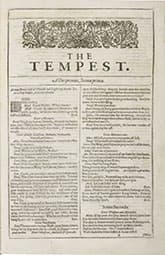The Tempest
 First folio 1623
First folio 1623First performance
1611
Literature form
Play
Genre
Comedy
Writing language
English
Author's country
England
Length
Five acts, 2,283 lines, approx. 16,000 words
'Brave new world' without irony
A favourite play. Not exactly sure why. It doesn't present many of the elements generally admired in drama. No great tragedy. Not much scintillating wit. Little realism. A fantastic plot and several fantasy characters, which would normally turn me off.
Not to mention an unbelievable love-at-first-sight romance and a wizard who makes everything right in the end.
Yet the first time I read it, as a requirement in high school, The Tempest became my favourite play. Of course, that wasn't difficult, since as a teenager I hated all the other dramas, especially Shakespearean, we were forced to slog through in class.
Still this one somehow resonated with me. Perhaps it was the intellectualism of it. The Tempest is Shakespeare's last play before retirement from the stage. It is rife with personal symbolism with the bard himself poised as the wizard Prospero about to break his staff (put down his pen) and give up his magic that directs the lives of characters. And it can be seen as a retrospective contemplation on the confusion of life and art, of fantasy and reality. The famous lines "We are such stuff as dreams are made on, and our little life is rounded with a sleep" are from The Tempest. The fantastic Ariel and Caliban obviously represent two aspects of the artist's psyche—the creative, imaginative side and the brutish, selfish side.
Despite this looking back and the sketchy storyline of Prospero taking revenge for past injustice, The Tempest is also a play that looks forward, and carries great hope for the future of humanity. Prospero forgives all, sets free the spirits and, in the love-match of his daughter Miranda with the son of the man who had wronged him, sets the course for a new beginning. Miranda makes her "O brave new world" exclamation during her first view of Ferdinand.
Centuries later the phrase "brave new world" has become ironic, but at that time—as the real world was being explored and expanded, as feudal rigidity was giving way to a new commerce-driven bourgeois democracy—these words could express the dreams and hopes of many. Prospero relegates serfdom, mysticism and blood-instilled relationships to the past and opens the way for a new generation to build a world on a different basis.
Happy tears
But that's all very intellectual. When I first saw The Tempest performed live, I was not prepared for the emotional impact of my favourite-on-paper play.
Perhaps it was the particular production (at Stratford, Ontario) or the particular actors (Len Cariou as Prospero, Sherry Flett as Miranda). I do not usually get emotional at plays or movies. But I found myself trying to hold back tears as one wonderful scene after another unfolded. Then I heard others sniffling near me in the dark theatre. It was obviously affecting other audience members similarly. Even the incredible love story played with such purity that it struck a hopeful chord deep in us all.
Apparently the themes of The Tempest are of more than historical interest but can continue to appeal to us in this more cynical age. I don't really know why. Do we feel the loss of a once-powerful optimism about the world? Do we yearn for a similar overthrow of a dark past? Do people of all eras carry deeply buried hopes for escaping a psychologically oppressive present into a wondrous future?
Or is Shakespeare simply an amazingly gifted writer who can play on our heart strings even with a somewhat silly story?
— Eric

